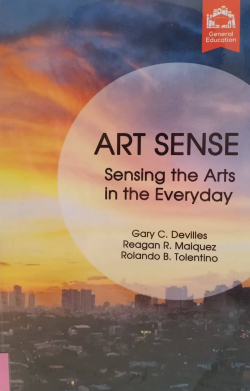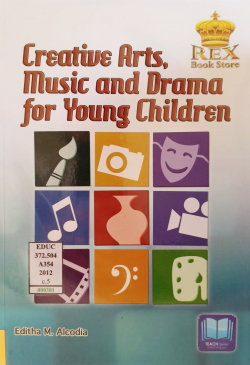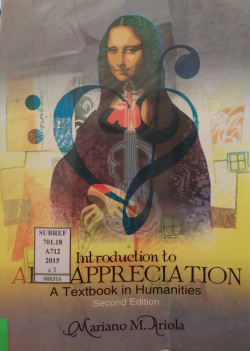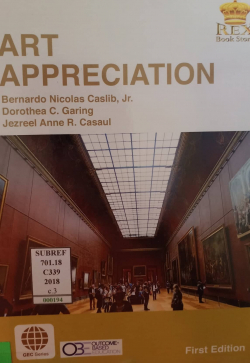Art sense: sensing the arts in the everyday

Buy online ($)
Type
Book
Authors
ISBN 13
9789719809302
Category
TLEd
[ Browse Items ]
Publication Year
2018
Publisher
C&E Publishing, Inc., Philippines
Pages
xxii, 313 pages
Subject
Philosophy of fine & decorative arts
Abstract
About the Book
Using interdisciplinary studies that cover the past twenty years, specifically feminism, postcolonial studies, human geography, and the most recent, affect theory and sensory studies, engagement with art objects becomes an exercise in self-reflexivity. From seeing, touching, or hearing an artwork, we get a sense of paradox, potentiality, or possibility. This textbook, aptly titled Art Sense: Sensing the Arts in the Everyday, creates an opportunity for critical engagement and reflexivity as students explore, examine, and evaluate the arts and their aesthetic experiences in the everyday life.
Strategically divided into five chapters, each alluding to a sense modality, Art Sense features a range of texts that talk about artistic engagement, starting with the limited sensorial experience of seeing, touching, or hearing the artwork, and then eventually leading to a self-reflexive epistemology of the modern world. Students will appreciate art through their sensory experiences as they write about various arts and genres and the connection to their everyday sensibilities and challenges. Among other things, students will curate an exhibit, take pictures to post on their Instagram accounts, view and analyze films, review a song, create a sound map, write a “smell journal,” examine the production of a food, and explore cinematic tactility.
For philosopher, Immanuel Kant, it is not enough that we treat aesthetic experience as a subjective experience since an encounter with beauty always aspires to a certain universality, from which such judgment becomes intelligible. In the end, these sense or sensory experiences lead not only to an articulation of artwork but also to what can possibly be known or what constitutes knowledge to begin with. In this textbook, the arts or writing about the arts, therefore, is treated as an epistemology (a form of knowledge) and ethics (8 way of cultivating oneself) especially in the most trying times and places when art becomes suspect and criticism is silenced.
Using interdisciplinary studies that cover the past twenty years, specifically feminism, postcolonial studies, human geography, and the most recent, affect theory and sensory studies, engagement with art objects becomes an exercise in self-reflexivity. From seeing, touching, or hearing an artwork, we get a sense of paradox, potentiality, or possibility. This textbook, aptly titled Art Sense: Sensing the Arts in the Everyday, creates an opportunity for critical engagement and reflexivity as students explore, examine, and evaluate the arts and their aesthetic experiences in the everyday life.
Strategically divided into five chapters, each alluding to a sense modality, Art Sense features a range of texts that talk about artistic engagement, starting with the limited sensorial experience of seeing, touching, or hearing the artwork, and then eventually leading to a self-reflexive epistemology of the modern world. Students will appreciate art through their sensory experiences as they write about various arts and genres and the connection to their everyday sensibilities and challenges. Among other things, students will curate an exhibit, take pictures to post on their Instagram accounts, view and analyze films, review a song, create a sound map, write a “smell journal,” examine the production of a food, and explore cinematic tactility.
For philosopher, Immanuel Kant, it is not enough that we treat aesthetic experience as a subjective experience since an encounter with beauty always aspires to a certain universality, from which such judgment becomes intelligible. In the end, these sense or sensory experiences lead not only to an articulation of artwork but also to what can possibly be known or what constitutes knowledge to begin with. In this textbook, the arts or writing about the arts, therefore, is treated as an epistemology (a form of knowledge) and ethics (8 way of cultivating oneself) especially in the most trying times and places when art becomes suspect and criticism is silenced.
Description
Colored Illustration ; 22 cm
Includes bibliographic reference and index
Includes bibliographic reference and index
Number of Copies
5
| Library | Accession No | Call No | Copy No | Edition | Location | Availability |
|---|---|---|---|---|---|---|
| Main | 509 |
TLEd 701.18 D494 2018 |
1 | REFERENCE SECTION | Yes | |
| Main | 510 |
TLEd 701.18 D494 2018 |
2 | REFERENCE SECTION | Yes | |
| Main | 511 |
TLEd 701.18 D494 2018 |
3 | REFERENCE SECTION | Yes | |
| Main | 512 |
TLEd 701.18 D494 2018 |
4 | REFERENCE SECTION | Yes | |
| Main | 513 |
TLEd 701.18 D494 2018 |
5 | REFERENCE SECTION | Yes |




